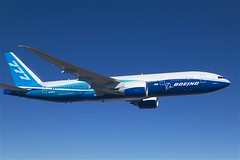Another aspect of the tale of two cities--Seattle and Detroit
 Boeing 777. AP photo.
Boeing 777. AP photo.A whole other thought occured to me many hours after I finished the earlier post. What about Boeing? Not that long ago, Seattle was as bad off, worse almost, than Detroit, just like people left Michigan in the 1970s and 1980s (and still are leaving) as the auto industry declined, the precipitous fall of Boeing and the decline of the area's manufacturing jobs pummelled Seattle ("Will the last person leaving Seattle turn out the lights?" wasn't that on a billboard, or a saying during that time period).
Finally, in the last year, Boeing has reconfigured its manufacturing processes and product line well enough that it is now competitive again with Airbus, at least in terms of the number of orders it is winning in head-to-head competition. But it wasn't that long ago when people thought that might be out of the question. And in the interim, Boeing moved its corporate headquarters to Chicago. (Although for a time Ford tried moving its Lincoln-Mercury division to Irvine, California to "freshen up its vision" as well.)
Did Boeing have better management, and fewer legacy costs compared to the U.S. automobile industry? In some ways, is it easier for Boeing because it has really only one major competitor, Airbus, and not a slew of competitors ranging from Toyota, and Nissan to companies like BMW, not to mention new competitors arising in China. (I would never have thought that the auto industry has "few" barriers to entry, but I suppose it does compared to the airline manufacturing business.)
So, the major manufacturing industry in the Seattle has been able to retool, and at the same time, Seattle plays an important role in the "new economy" through the presence of a wide-variety of computing related companies, with Microsoft at the center.
Does Seattle do better than Detroit because it has a more diversified economy or because its manufacturing industry has been able to retool? Maybe people from the Northwest could weigh in...
Index Keywords: urban-revitalization



0 Comments:
Post a Comment
<< Home